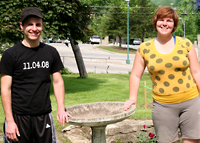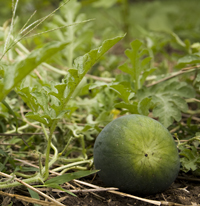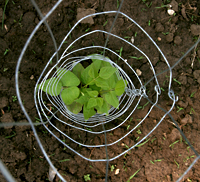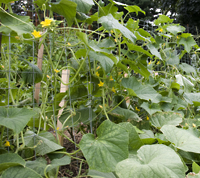Students plant community garden
In January 2009, they had nothing more than some sketches and a map. Since then, approximately 10 people have come together to create a UMKC community garden. On the lawn south of the School of Education, UMKC’s community gardeners are growing arugula, collards and other greens, peppers, broccoli, tomatoes, sweet potatoes, corn, radishes and squash.
Sean McClain and Jessica Farmer started the garden project in the spring. After UMKC’s University News ran a story about the garden, Jessica’s email lit up with offers of help.
Both students were enthused about the cooperation and excitement generated by the garden and the attendant publicity, and joked that their families had caught on to the healthy benefits – and the savings – of growing their own food.
Good Neighbors
McClain and Farmer found that involving neighborhood gardeners was slow, but next-door-neighbor Ken offered advice and a watchful eye. Florence, an administrative assistant in the Department of Chemistry, devoted time to weeding.
Several Kansas City organizations offered support: TWIG – Think, Work, Inspire, Grow – was there from the beginning. The Bridging the Gap Rain Barrel Workshop familiarized the group with capturing and using rainwater. And Kansas City Community Gardens tested soil, helped plan ground preparation and tilled the land.
Farmer knows how fortunate they were to have so much help and advice.
“(UMKC) Administration was wonderful,” Farmer said. “When our first location didn’t work out, Bob Simmons (Assistant Vice Chancellor of Facilities) showed us other potential sites.”
A Growing Garden Crew
Before McClain and Farmer graduated, they recruited another core group of gardeners – Suzie Spitzmiller, James Mitchell, Sam Macdonald and Andy Clarke.
By the end of July, the garden was a riot of green in every shade, broken occasionally by a colorful fruit or flower. Almost every day was a work day.
The students’ mantra has always been “Take what you need. We’ll give the rest away.” They set up a table in the quad for two reasons: they could give away delicious, farm-fresh produce and ask people to become involved in future urban farm projects.
“Food is democratizing,” Macdonald said. “Read ‘Food Not Lawns’ or ‘The Future of Food.’ With food production rapidly becoming privatized, we’re sharing in something more than a garden.”
That “something” may be the key to forming a genuine community around a mutual interest. In numerous articles about neighborhood gardens, obvious differences in age, race, socioeconomic status or background are completely ignored by the participants.
Plenty of Models
From Eugene, Ore., to Yarmouth, Maine, and New York – and in England, Ireland and Australia – gardeners are tilling two kinds of common ground.
Gardening has been credited with improving physical and mental health, fostering pride of place, reducing waste and feeding the hungry – there is no downside. Older people – often condemned by circumstances to a life of solitude – make new friends. Four-year-olds weed and dig. Neighboring business owners drop by with cash, seeds or equipment. Gardeners with physical, mental or learning disabilities can join in.
A Canadian garden group’s slogan proclaims, “We not only grow vegetables, we grow hope.” The group’s mission develops this theme: “Our garden seeks to sow the seeds of social justice, community, economic development and ecological sustainability.”
UMKC’s student gardeners feel this same communal spirit. Andy Clarke’s house on Rockhill Road sits next to a vacant UMKC property that he has permission to use for a garden. He will use this lot as a test site for plants and as a drawing card for other neighbors and passers-by on the high-traffic street.
“People who garden and love fresh, local food will be attracted to our space,” Clarke said. “Everything comes from the earth,” Clark continued, “and food is our common denominator.”




